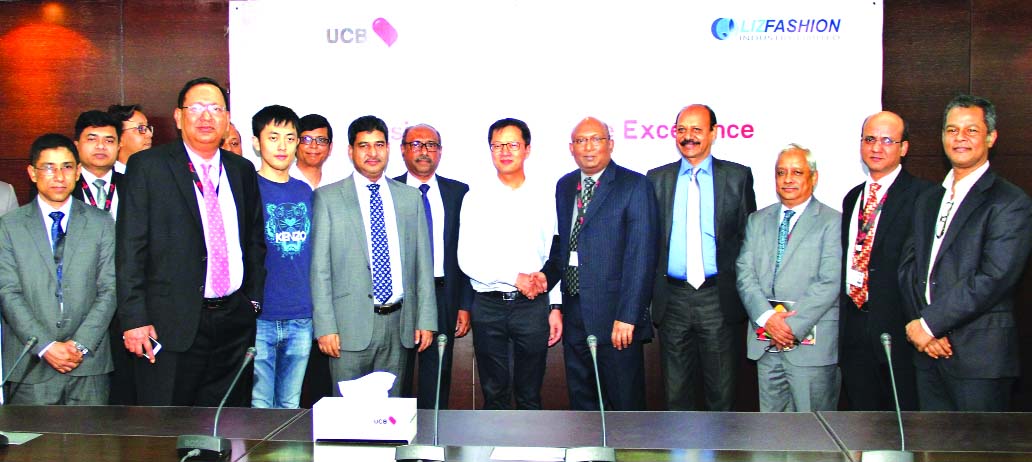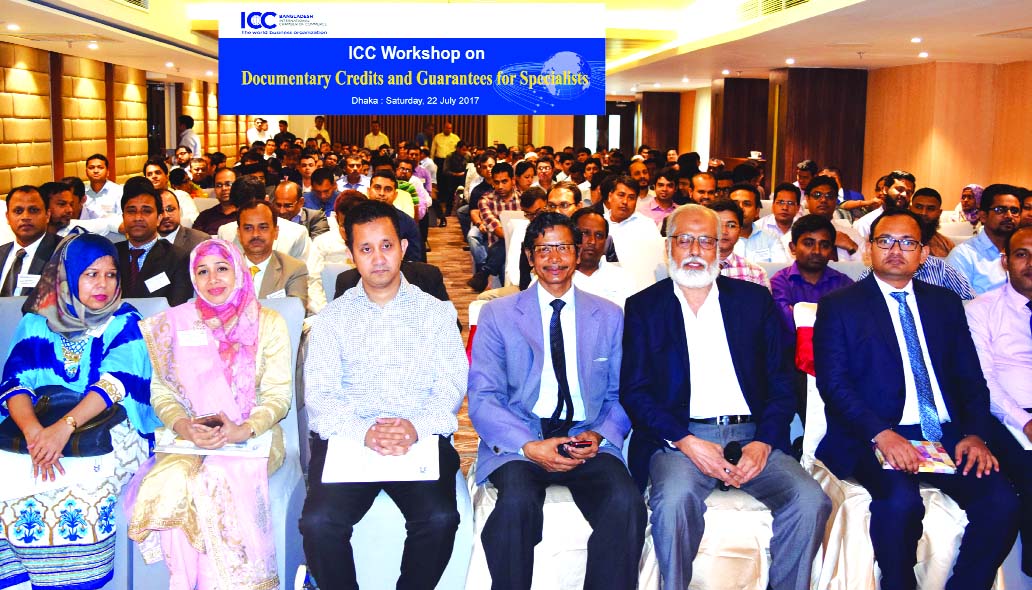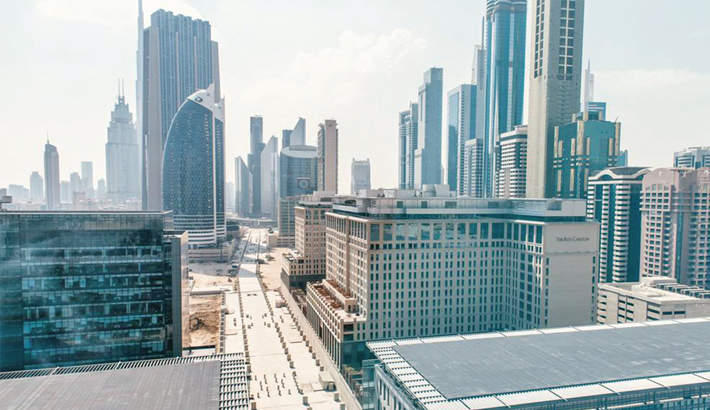AE Abdul Muhaimen, Managing Director of UCB and Leo Zhuang, Managing Director of Liz Fashion Industry Ltd. shaking hands after inaugurating Internet Banking Service at the bank's head office in the city recently. Top officials from both the organizations
 AE Abdul Muhaimen, Managing Director of UCB and Leo Zhuang, Managing Director of Liz Fashion Industry Ltd. shaking hands after inaugurating Internet Banking Service at AE Abdul Muhaimen, Managing Director of UCB and Leo Zhuang, Managing Director of Liz Fashion Industry Ltd. shaking hands after inauguthe bank\'s head office in the city recently. Top officials from both the organizations
AE Abdul Muhaimen, Managing Director of UCB and Leo Zhuang, Managing Director of Liz Fashion Industry Ltd. shaking hands after inaugurating Internet Banking Service at AE Abdul Muhaimen, Managing Director of UCB and Leo Zhuang, Managing Director of Liz Fashion Industry Ltd. shaking hands after inauguthe bank\'s head office in the city recently. Top officials from both the organizations
News:new nation/1-Aug-2017
Md. Arfan Ali, Managing Director of Bank Asia Ltd. poses with the participants of the 5th EC and 1st General Meetings of SWIFT member and users group of Bangladesh at a hotel in the city on Wednesday. Kazi Masihur Rahman, CEO, Mercantile Bank Ltd, Md. Ahs
 Md. Arfan Ali, Managing Director of Bank Asia Ltd. poses with the participants of the 5th EC and 1st General Meetings of SWIFT member and users group of Bangladesh at a hotel in the city on Wednesday. Kazi Masihur Rahman, CEO, Mercantile Bank Ltd, Md. Ahs
Md. Arfan Ali, Managing Director of Bank Asia Ltd. poses with the participants of the 5th EC and 1st General Meetings of SWIFT member and users group of Bangladesh at a hotel in the city on Wednesday. Kazi Masihur Rahman, CEO, Mercantile Bank Ltd, Md. Ahs
BB resumes selling US dollar to stabilise exchange market
Demand for the greenback grows with rising imports
The central bank has resumed after one month the sales of US dollar to the commercial banks to provide them with foreign exchange support and stabilise the market, officials said.
As part of the move, Bangladesh Bank (BB) sold US$ 20 million at market rate to two commercial banks directly on Thursday to meet the growing demand for the greenback in the exchange market.
"We've sold the US dollar to facilitate the banks for making payments against import bills of petroleum products," a senior official at the BB told the FE.
He said the central bank might continue supporting the banks with the foreign currency subject to market requirement.
"We've provided such foreign currency support to the banks only for settling import payment obligations against food grains and fuel oils," he explained.
Earlier on July 25, the BB sold same amount of the US currency to a leading state-owned commercial bank for making payment of their food grains import bills.
In May last, it sold $21 million to the banks, according to the BB statistics.
The BB's latest move came against the backdrop of depreciation of the Bangladesh Taka (BDT) against the US dollar in both the inter-bank foreign exchange market and customers' end in the recent days.
The US dollar was quoted at Tk 80.65-Tk 80.66 in the inter-bank foreign exchange market on the day against Tk 80.64 on July 26, according to the market operators.
On the other hand, the exchange rate of the greenback for BC (bills for collection) selling rose to Tk 81.7338 Sunday from Tk 81.7326 of the previous working day.
It was Tk 81.7062 on July 26, according to the statistics of the Bangladesh Foreign Exchange Dealers Association (BAFEDA).
The country's foreign exchange reserve stood at $32. 84 billion Sunday, despite selling of $40 million to the commercial banks for settling import bills in the last week, according to another BB official.
"We expect that the inflow of foreign exchange may increase in the month following the upward trend of the inward remittance ahead of the Eid-ul-Azha," he said.
Bangladesh received $1.02 billion in remittances between July 1 and July 28 from expatriate Bangladeshi nationals who are working abroad. It may cross $1.10 billion by the end of July.
"But the flow of inward remittance may rise in the month of August ahead of the Eid," the BB official said.
Meanwhile, some banks are now holding sufficient amount of the greenback as the central bank raised substantially the net open position (NOP) limit of the banks last year, according to market insiders.
They said the banks are now following a 'go-slow' strategy for selling the greenback to the other banks.
"The banks believe that the exchange rate of BDT against the US dollar will depreciate further in the near future for making import bills of different commodities, particularly food grains," a senior treasury official of a leading private commercial bank explained.
He said the import of food grains might increase substantially in the coming months to meet the growing demand for the essential commodities in the domestic market.
The NOPs of all the 56 scheduled banks have been increased by more than 45 per cent to US$ 2.19 billion from previous $1.51 billion.
It was determined on the basis of 20 per cent of the total regulatory capital of the banks as on March 31, 2016, according to the BB officials.
Saudi central bank reserves up for 1st time
RIYADH: Saudi Arabia’s central bank reserves rose for the first time in over a year, even as low oil prices hinder government efforts to overall an economy dependent on energy exports.
Net foreign assets at the Saudi Arabian Monetary Agency increased to US$493.2 billion in June from $491.7bn in the previous month, according to a monthly report published on its website. It was the first increase since May 2016, according to data compiled by Bloomberg.
The rise is surprising, “especially given that the government’s deposits with the central bank continued to fall in the month,” said Monica Malik, the chief economist at Abu Dhabi Commercial Bank.
News:Daily sun/31-jul-2017StanChart bullish on UAE despite slowing economy

DUBAI: Standard Chartered, the emerging market specialist bank, said the UAE is among the top markets for the financial institution despite the slowdown in the country’s economic growth.
Like Hong Kong and Singapore, the UAE is a trading hub with a large expat population, said Karen Fawcett, the head of retail banking for the London-based lender, reports The National.
“The UAE Singapore and Hong Kong are a group of markets which are very interesting to us because they are hub markets,” she told The National in an interview.
“They are special markets in terms of their trading hubs. They are places which attract a lot of expatiates to these financial centres. They attract a lot of the type of profile clients that we want and we’ve been in these markets for a very long time. It’s among our strong markets.”
Standard Chartered has faced tough times in many emerging markets since 2014, when the price of oil collapsed.
However, this year there has been an improvement in the economies of many developing nations, including the UAE where despite the economic slowdown there has been an amelioration in consumer banking.
Still, there are signs of ongoing pressure for the bank in the region.
And while the bank has not yet released its second quarter earnings, it said in April that operating income in the Middle East and Africa fell by 3 per cent in the first quarter amid currency devaluations in Africa and lower financial market income from the Middle East.
Operating income fell to US$686 million in the first three months of the year compared with $709m in the same quarter last year, the bank said.
And in November, the bank announced it was cutting 150 jobs in the UAE amid a lending slowdown.
That announcement was part of a wider cost-cutting plan announced in 2015 when the bank revealed plans to shed 15,000 jobs worldwide after years of losses, but it did not say at the time how many positions would be lost across its local operations.
The lender had been badly hit as the value of most commodities, which underpin the economies of many emerging markets including that of the Arabian Gulf, had fallen sharply.
Some of those commodity prices are starting to recover but the bank is not relying on a recovery of those prices alone and is taking measures to cut costs. This includes trimming its branch networks in an age when more of the affluent customers Standard Chartered is chasing eschew going to the bank and prefer to bank on their mobile phones.
Ms Fawcett said that banks now realise that with fewer people using branches that it is better to have smaller branches in key locations where people spend money, such as shopping malls.
“We’ve closed more than 10 per cent of our branches in the last two years,” Ms Fawcett said, “and rationalised about 30 per cent, shrinking, changing the format.
“Client behaviour is changing so we’re investing in the things that people want.” In May Shehzad Hameed, the head of retail banking at Standard Chartered in the UAE, said that sales of its retail products are growing at a strong pace that should stay that way all year long.
“Sales have had double-digit growth in the first quarter of the year,” Mr Hameed said. “We expect this to sustain throughout the year. Last year was a tough year for the retail business.”
In April, the global consultancy Alvarez & Marsal, in its inaugural report on the UAE banking sector, found increasing signs of recovery following the tough times.
“The good news is we are seeing signs of this downward cycle bottoming out,” said Saeeda Jaffar, the man-aging director at Alvarez & Marsal.
News:Daily sun/31-jul-2017


